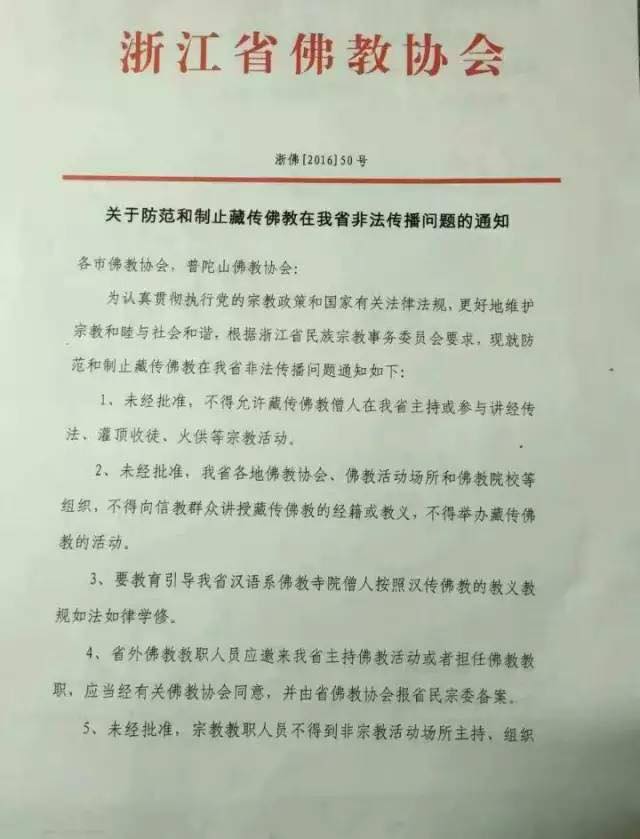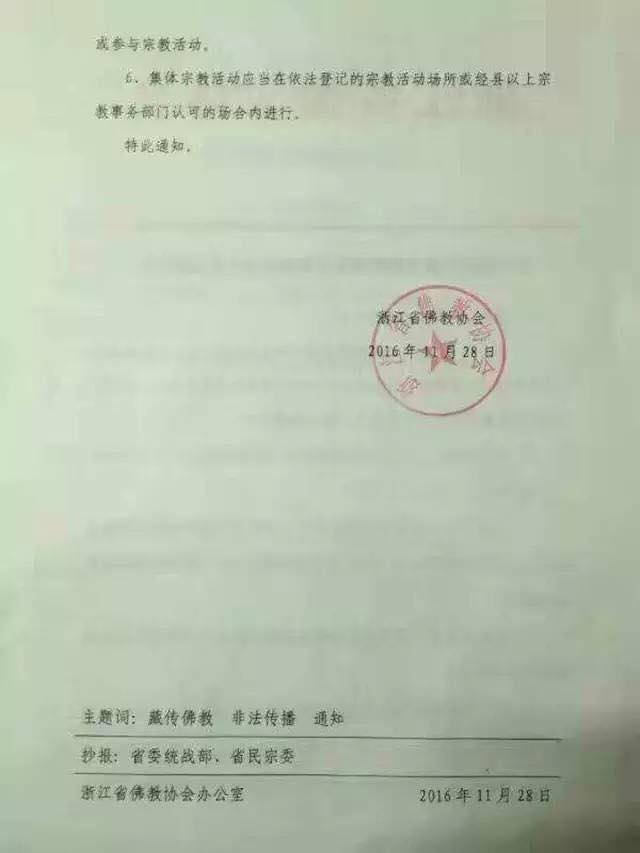China’s Buddhist supervisory body announces explicit restrictions on Tibetan Buddhism

A notice issued by a provincial unit of the Buddhist Association of China (BAC), China’s state supervisory body on Buddhism, has called for the prevention and restriction of the ‘illegal’ propagation of Tibetan Buddhism in Zhejiang province located in the eastern part of the People’s Republic of China.
The notice bars monks practicing Tibetan Buddhism from visiting Zhejiang province to give teachings, conduct empowerment rituals, and other rituals without government approval. Approval is also required for teaching of Tibetan Buddhist texts and scriptures or holding other related activities at Buddhist centres, Buddhist associations or Buddhist universities in the province. Other Buddhist religious personalities wishing to visit the province to lead religious ceremonies or work as religious instructors are required to obtain permission from relevant BAC units, and to register with the provincial civil affairs department. Additionally, religious personalities require permission to organize or participate in religious activities in places where religious activities are not allowed. Religious gatherings organised by the general public must be held at lawfully registered religious venues or at venues approved by the relevant religious affairs bureau from county level upwards. A separate article in the notice orders all the Buddhist associations in the province to advise and guide monks of Chinese Buddhism to practice their faith in the Chinese Buddhist tradition.
The six-point notice issued on 28 November in the name of Zhejiang Province BAC was addressed to all BAC units in the province and separately to the Buddhist Association of Mt. Putuo. Taken together, the contents of the notice demonstrate extreme suspicion and paranoia of the Chinese authorities against the spread and popularity of Tibetan Buddhism in the larger Chinese society.
Although the notice does not elaborate on what constitutes ‘illegal’ propagation of Tibetan Buddhism, it claims that the notice was issued “on the request of the Zhejiang Province Religious Affairs Bureau to thoroughly implement the basic religious policy of the Communist Party of China and other laws and regulations on religious affairs, and to improve religious harmony and social harmony.”
Last year in July, active Chinese netizens exposed attempts by local authorities in Zhejiang to foment communal hatred and violence between Buddhists and Christians. Local authorities were caught sending in Buddhist monks to burn incense and chant Buddhist scriptures to provoke Christian believers as they faced off with a government-backed demolition team that was trying to remove a cross from a church roof.
The importance of Zhejiang, together with Jiangsu province, as a centre for Buddhism in Mainland China cannot be overstated. Both provinces have long been considered the heart of active Chinese Buddhist education and training, and are major Buddhist strongholds in China. Experts have long contended that the Buddhist population, both monastic and lay, in these two provinces outnumbered those in most of the other provinces combined.
Mt. Putuo is one of China’s four sacred Buddhist pilgrimage sites located in Zhejiang. The others are Mount Wutai in Shanxi Province, Mount Emei in Sichuan Province, and Mount Jiuhua in Anhui Province. Buddhists believe that Mt. Putuo is home to Avalokitesvara, the Buddha of Compassion. The Tibetan spiritual leader His Holiness the Dalai Lama is considered the emanation of the Buddha Avalokitesvara. In 1925, the 9th Panchen Lama visited Mt. Putuo where he taught thousands of Chinese Buddhist monks and conducted empowerment rituals thus marking another important chapter of Tibetan Buddhists reaching Chinese audiences. Buddhists consider Mt. Wutai the most important as it is home to Manjushri (Buddha of Wisdom). The current Dalai Lama had in the recent past expressed his wish to visit Mt. Wutai for pilgrimage.



